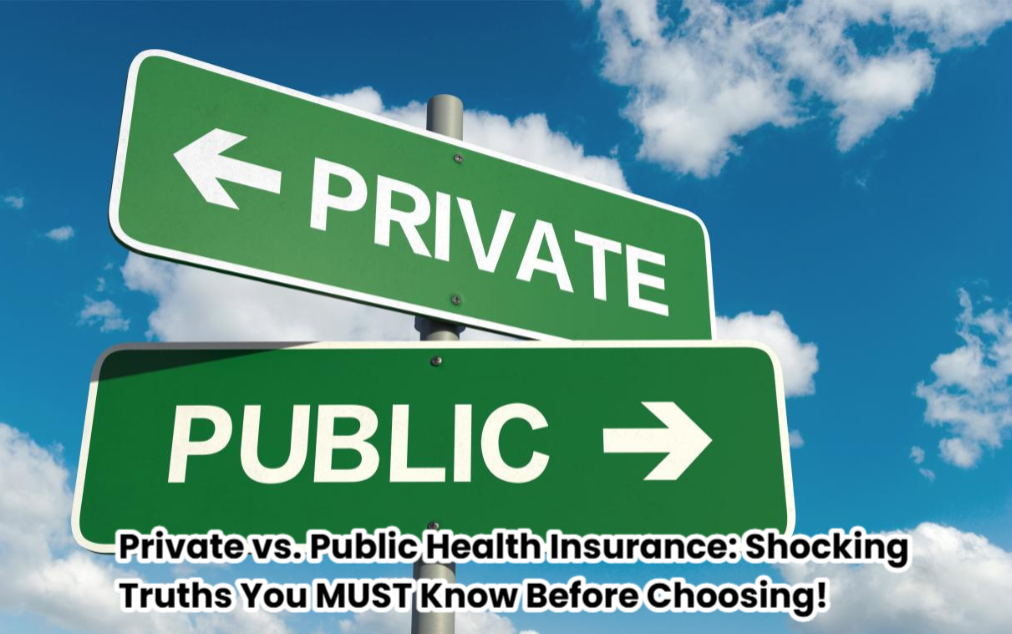Health insurance is a critical component of financial and medical security. As healthcare costs rise, choosing the right insurance plan is key. It helps you access quality medical services without financial stress. Choosing between private and public health insurance can feel overwhelming. Each option has its own benefits and drawbacks.
Public health insurance is usually funded by the government. It aims to cover many people, often at a lower cost. Private health insurance comes from private companies. It usually offers more flexibility and extra benefits.
This article covers the differences between private and public health insurance. We’ll look at their pros and cons, key factors to consider, and answer common questions to help you decide.

Understanding Public Health Insurance
Public health insurance gets its funding and rules from the government. This helps eligible people access healthcare. It usually targets specific groups. These include low-income individuals, senior citizens, and people with disabilities.
Examples of Public Health Insurance Programs
- Medicare (U.S.) – Covers individuals aged 65 and older or those with disabilities.
- Medicaid (U.S.) – Provides coverage for low-income individuals and families.
- National Health Service (NHS) (U.K.) – Offers universal healthcare funded through taxation.
- Canada’s Medicare System – A publicly funded healthcare system covering all citizens.
- Australia’s Medicare System – Provides basic medical services funded by the government.
Benefits of Public Health Insurance
- Lower Costs – Public health insurance plans usually cost less because the government supports them.
- Wide Accessibility – These plans often cover essential medical services without excessive out-of-pocket expenses.
- Coverage for Pre-Existing Conditions – Public insurance programs usually cover pre-existing conditions. This is different from some private plans, which may charge higher premiums.
- Public health plans offer basic healthcare services to everyone who qualifies.
Drawbacks of Public Health Insurance
- Limited Provider Options – Public plans may restrict enrollees to a network of doctors and hospitals.
- Long Wait Times – Due to high demand, accessing specialized care can take longer in public healthcare systems.
- Less Personalized Care – There may be fewer options for customized healthcare services.
- Limited Coverage for Certain Services – Some elective procedures, dental care, and vision care may not be covered.
Understanding Private Health Insurance
Private health insurance is provided by companies and organizations outside the government. You can buy these plans individually, through your employer, or as extra coverage with public insurance.
Types of Private Health Insurance Plans
- Employer-Sponsored Insurance – Provided by companies as part of employee benefits.
- Individual or Family Plans – Purchased directly from private insurers.
- Supplementary Plans – Additional coverage for services not included in public insurance.
- Short-Term Plans – Temporary insurance for specific needs.
Benefits of Private Health Insurance
- More Provider Choices – Private plans usually offer access to a wider network of doctors and hospitals.
- Faster Access – Private healthcare usually means shorter wait times for specialists and treatments.
- Comprehensive Coverage Options – Many private plans cover dental, vision, and elective medical procedures.
- Flexible Plans – Customizable plans allow individuals to choose coverage that fits their needs.
Drawbacks of Private Health Insurance
- Higher Costs – Premiums, deductibles, and out-of-pocket expenses can be significantly higher.
- Pre-Existing Condition Limitations – Some private plans may charge higher premiums for pre-existing conditions.
- Complexity in Plan Selection – The variety of plans and coverage options can be confusing.
- Possible Denials or Restrictions – Some treatments or claims may be denied based on policy terms.
Key Factors to Consider When Choosing Between Public and Private Insurance
1. Your Budget
- If affordability is a primary concern, public insurance may be the better choice.
- If you can pay higher premiums for extra benefits, private insurance might give you better coverage options.
2. Healthcare Needs
- Individuals with chronic conditions may benefit from public insurance due to lower costs.
- Those seeking specialized care or elective procedures may find private insurance more suitable.
3. Provider Preference
- Private insurance gives you more flexibility if you want to choose your doctors and hospitals.
- Public insurance often restricts coverage to specific healthcare networks.
4. Waiting Times for Treatment
- Public healthcare systems often have longer wait times for non-emergency treatments.
- Private insurance usually allows quicker access to specialists and elective procedures.
5. Employer-Sponsored Benefits
- If your employer offers comprehensive private insurance, it may be a cost-effective option.
- If you can’t get employer-sponsored insurance, public healthcare can provide valuable coverage for less cost.
6. Coverage for Family Members
- Public insurance often extends to dependents at a lower cost.
- Private insurance plans may require additional premiums for family coverage.
Must read:
- Insurance 101: The Ultimate Beginner’s Guide to Safeguarding Your Financial Future
- Shocking Truth: Why You Can’t Afford to Skip Insurance in Today’s Uncertain World!
- Comprehensive vs. Collision Coverage: Shocking Differences You MUST Know Before It’s Too Late!
Frequently Asked Questions (FAQs)
Is public health insurance free?
Does private health insurance cover pre-existing conditions?
Can I have both public and private health insurance?
Which type of insurance offers better quality care?
What happens if I do not have health insurance?
Conclusion
Choosing between public and private health insurance involves several factors. Consider your budget, healthcare needs, preferred providers, and if your employer has a plan. Public insurance is affordable and gives broad access to essential medical services. Private insurance, on the other hand, offers more flexibility, shorter wait times, and extra coverage options.
Ultimately, the best choice will depend on your individual needs and circumstances. Carefully assess your healthcare priorities and budget before deciding on the most suitable plan for you and your family. If needed, consult with an insurance expert to explore the best options available.
